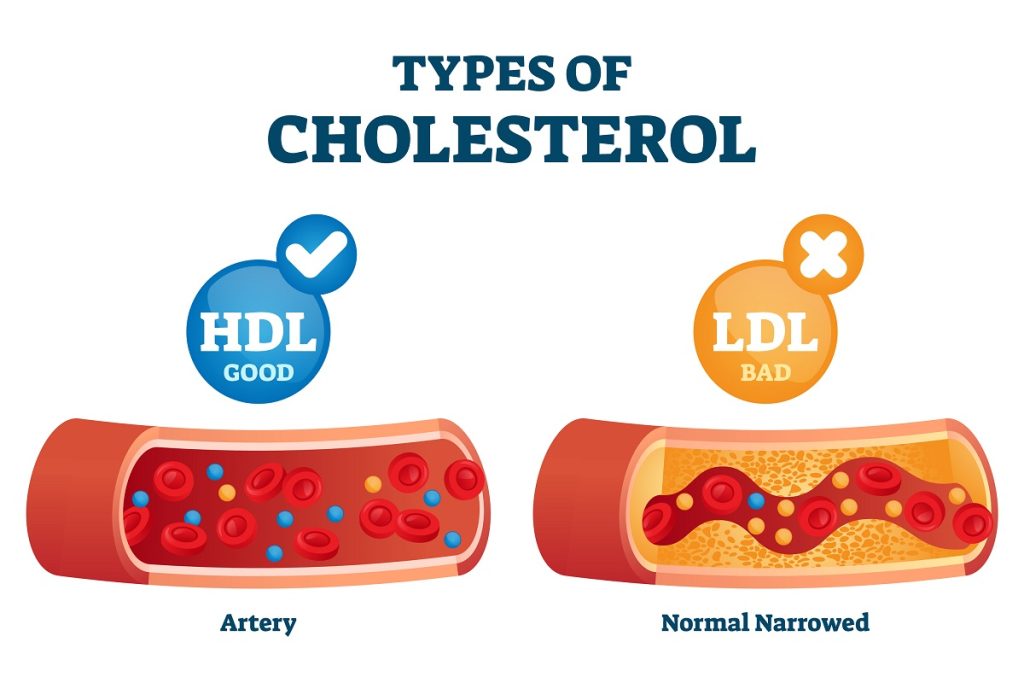Omega 3 fatty acids are often referred to as an ‘essential oil’ for the human body. Though it ha s multiple benefits for different parts of the human body like the heart, brain, bones and joints, skin, eyes, etc., our body sadly does not produce it. Thus, we have to either source it naturally from dietary inputs like fatty fish of Rohu, Katla, salmon, and Indian Mackerel or get it from nuts and seeds like walnuts, flax seeds, chia seeds. Alternatively, dietary supplements in the form of capsules also help.
Omega 3 are polyunsaturated fats, which ideally comprise of three components, namely:
- Alpha-linolenic acid (ALA)
- Docosahexaenoic acid (DHA)
- Eicosapentaenoic acid (EPA)
While ALA is primarily found from plant sources, DHA and EPA are available from both plant and animal sources, like fatty fishes and nuts.
Role of Omega-3 in Managing cholesterol

TrueBasics Omega 3 fatty acids play a significant role in our body’s lipid metabolism. Several studies have shown that with the required levels of Omega 3 in our bodies, there is a substantial decrease in cholesterol. This happens due to the following reasons:
1. Helps Reduce Triglyceride Levels:
Triglycerides are fats stored in our body for use as energy when needed. However, when there is a nutritional imbalance or a metabolic slowdown due to certain health conditions, the triglyceride level starts to increase and the body starts storing fat in the form of cholesterol.
Omega-3 has a dual effect on triglycerides. It not only regulates and reduces the rate at which our liver produces Triglycerides, but DHA and EPA also help in decreasing the stored levels of triglycerides to a great extent.
As per studies, consuming the prescribed amounts of Omega 3 fatty acids is known to lower the triglyceride level. Therefore, it also helps reduce cholesterol in the body.
2. Helps Increase HDL Levels:

Omega 3 fats are known to increase the High-Density Lipoprotein (HDL) marginally while helping to reduce the Low-Density Lipoprotein (LDL). HDL cholesterol is known as ‘good cholesterol’ because it helps in improving heart health.
Studies have also shown that with adequate and regular intake of Omega-3 fatty acids, there is a noted increase in the size of LDL molecules in the blood. Smaller LDL particles put you at a greater risk of atherosclerosis (plaque formation on the walls of arteries and blood vessels).
1. Supports in Reduction of risk of plaque formation:
Consuming ample Omega-3 fatty acids reduces the risk of atherosclerosis by reducing plaque buildup in the arteries. It also helps to make the blood thinner, aiding easy flow throughout the body.
Studies have also found that the benefits of Omega-3 fatty acids on the reduction of cholesterol are dose-dependent. It is very difficult to meet this essential nutrient’s dietary requirement through the food we eat as that would mean impractically large portions of seeds, fish, and nuts daily. That is why experts suggest the intake of Omega-3 supplements to ensure our bodies get their required amount daily.
However, despite TrueBasics Omega fatty acids’ ability to reduce cholesterol, one must be careful while consuming them. Especially people on blood-thinning medication must consult their doctor before starting this supplementation.













